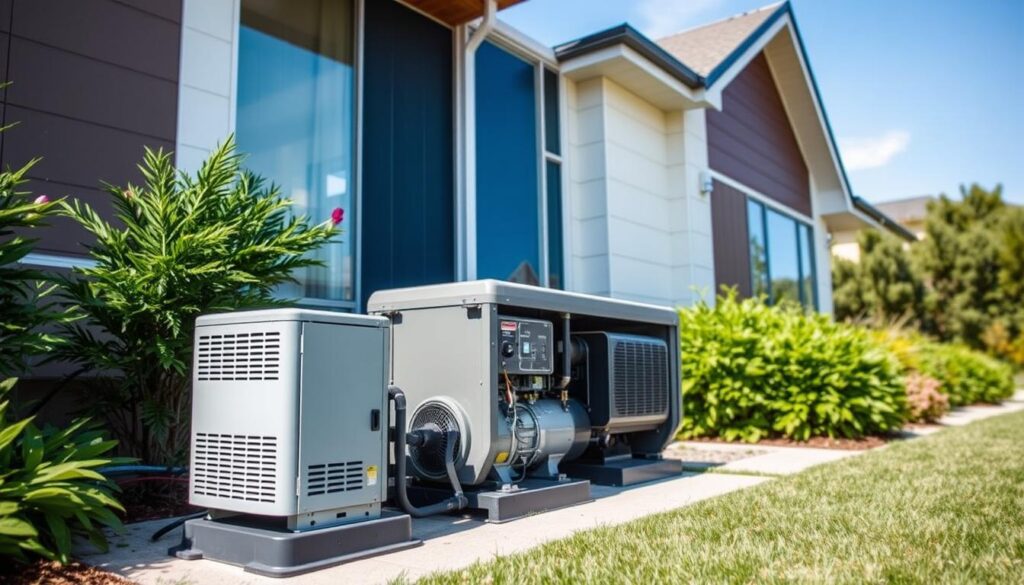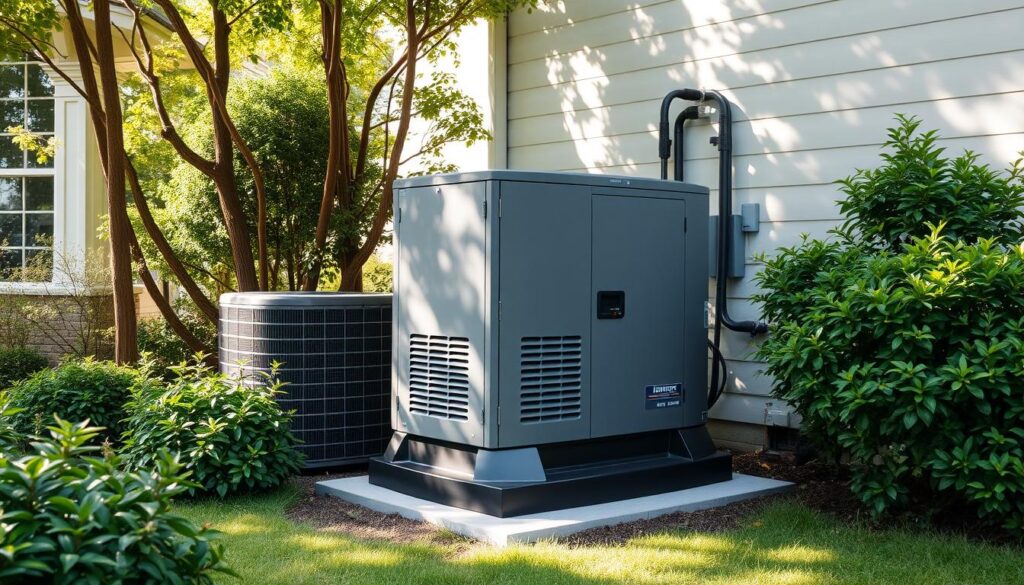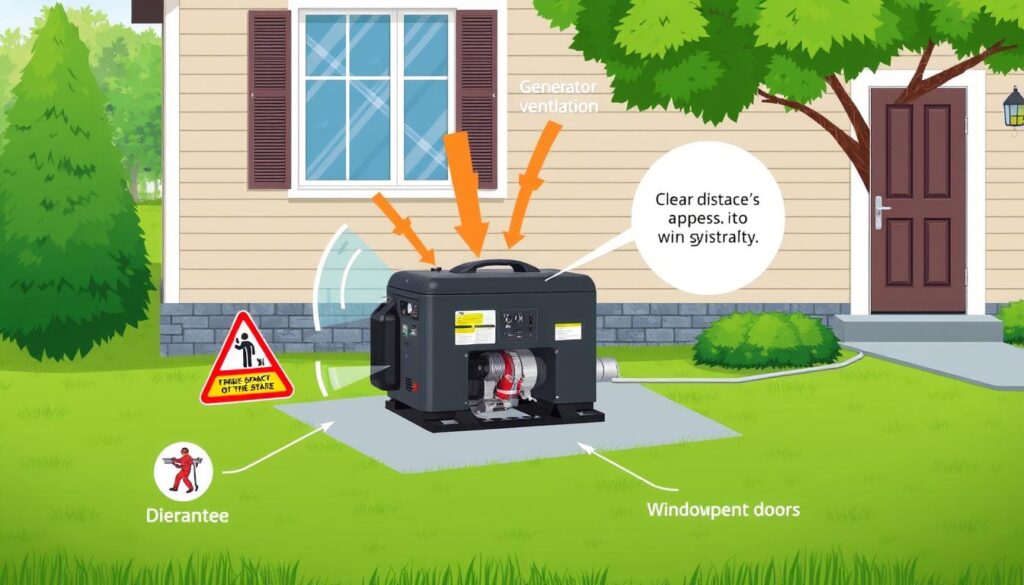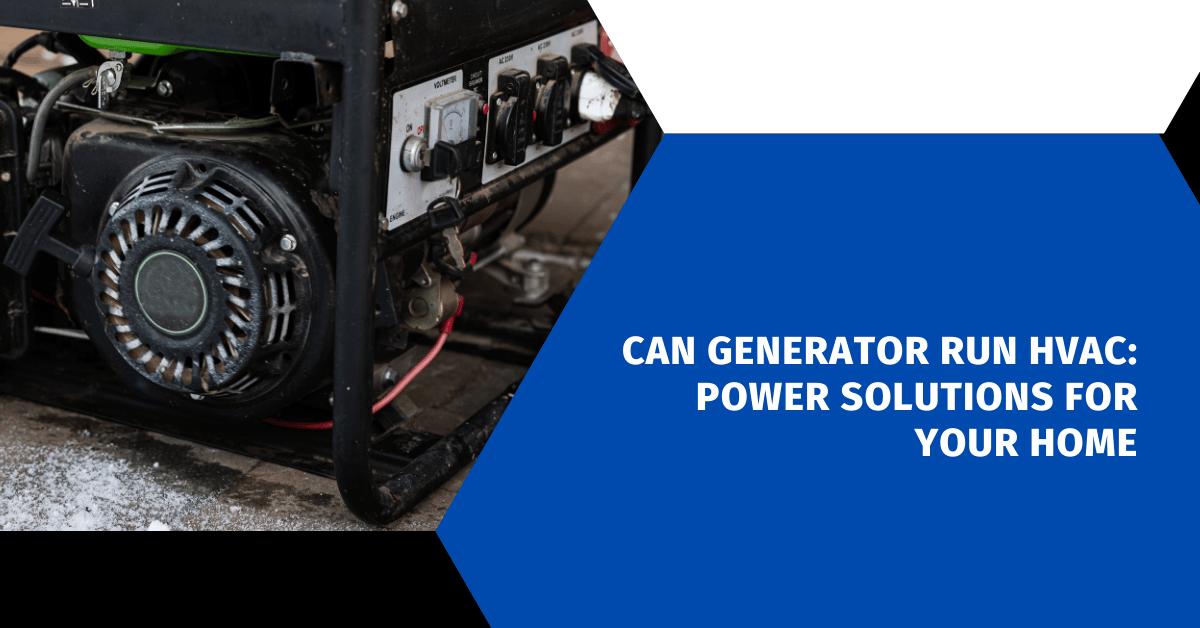Affiliate Disclosure
HVAC Guide Guys is a participant in the Amazon Services LLC Associates Program, an affiliate advertising program designed to provide a means for sites to earn advertising fees by advertising and linking to Amazon.
Can Generator Run HVAC? Hurricane Ian left over 2 million Floridians without power. This has made emergency generators very popular. They can keep your lights on and your HVAC system running during outages.
It’s important to know how much power your generator needs. You also need to make sure it works well with your HVAC system. This ensures your home stays comfortable when the power goes out.

Key Takeaways
- Generators provide essential backup power for HVAC systems during outages.
- Proper sizing and selection are crucial for effective and safe operation.
- Compatibility factors, such as starting vs. running wattage, must be considered.
- Fuel type and efficiency can impact generator performance and HVAC operation.
- Professional installation and maintenance are recommended for optimal generator use.
Table of Contents
Understanding Generator Basics and Power Requirements
Generators are vital for keeping your home or business running during power outages. Knowing about generator types, power calculation, and wattage needs helps you choose the right one. This ensures your essential appliances and systems stay operational.
Types of Generators Available
Generators vary in size and type to meet different power needs. Here are some common ones:
- Small portable generators, such as the Generac iQ3500, which typically range from 1,000 to 3,000 watts of power.
- Large portable generators, like the DuroMax XP12000E, which can provide 10,000 watts or more of power.
- Whole-home standby generators, exemplified by the Generac 70432, that can generate 10,000 watts or more to power an entire household.
How to Calculate Power Needs
To find the right generator size, calculate the total wattage needed. Add up the running wattage of each appliance. Also, include the starting wattage for devices with electric motors, like air conditioners or refrigerators.
Wattage Requirements for Common Appliances
Here’s a quick guide to the wattage needs of common household appliances:
| Appliance | Running Watts | Starting Watts |
|---|---|---|
| Central Air Conditioner | 2,000-4,000 | 3,000-6,000 |
| Refrigerator | 600-800 | 1,200-2,400 |
| Water Pump | 1,000-2,000 | 2,000-4,000 |
Knowing the power needs of your essential appliances is crucial. It helps you pick the right generator for your home or business during a power outage.
Explore Our HVAC Shop
Looking for top-rated HVAC tools, parts, and accessories? Visit our shop and find the perfect solution for your needs.
Visit the ShopCan Generator Run HVAC: Essential Compatibility Factors
When a power outage hits, knowing if your generator can power your HVAC is key. The generator’s power, your HVAC’s needs, and your home’s electrical setup all matter. These factors are crucial for keeping your home comfy.
Think about your HVAC type. Gas furnaces might need a whole-house generator for clean power. Electric furnaces, however, need even more power. Central air and heat pumps usually work with a portable generator, if sized right.
To see if your generator fits your HVAC’s power needs, look at the starting and running wattage needs. HVACs use a lot of power when starting up. Using too much power can damage your generator. So, it’s important to pick a generator that matches your HVAC’s power use.
| HVAC System Type | Typical Starting Wattage | Typical Running Wattage |
|---|---|---|
| Central Air Conditioner | 3,500 – 5,000 watts | 2,000 – 4,000 watts |
| Heat Pump | 800 – 5,100 watts | 800 – 3,500 watts |
| Electric Furnace | 5,000 – 15,000 watts | 5,000 – 10,000 watts |
| Gas Furnace | 1,000 – 3,000 watts | 500 – 1,500 watts |
Knowing your HVAC’s power needs and choosing the right generator ensures comfort at home, even without power.
“Consulting with an electrician is recommended to assess power needs and avoid potential risks when considering a generator installation.”
Explore Our HVAC Shop
Looking for top-rated HVAC tools, parts, and accessories? Visit our shop and find the perfect solution for your needs.
Visit the ShopSelecting the Right Generator Size for Your HVAC System
Choosing the right generator size is key when powering your home’s HVAC system during an outage. HVAC systems, especially central air conditioning units, need a lot of power. It’s important to consider this carefully.
Starting vs. Running Wattage
HVAC systems need more power to start up, often three times what they use when running. For example, a 3-ton heat pump uses 2,930 watts steady-state. But it might need over 8,000 watts to start. This is why you need a generator that can handle these power surges without damage.
Calculating Total Power Requirements
- Think about the power needs of other important appliances too, like refrigerators, lights, and computers.
- Portable generators range from 2,000 to 12,000 watts. Standby generators can go up to 22,000 watts or more.
- Get a professional electrician to figure out the right generator size for your needs.
Avoiding Generator Overload
Running a generator too hard can cause it to shut down or overheat. This can damage the generator and your appliances. To avoid this, pick a generator that’s at least 20% bigger than your HVAC system and other essential loads need.
“Proper generator sizing is critical to ensure your HVAC system and other essential appliances can run safely and reliably during a power outage.”
Portable vs Standby Generators for HVAC Operation
When a power outage hits, you have two main choices: portable generators and standby generators. Each has its own benefits and meets different needs. It’s key to know the differences before deciding.
Portable generators are easy to move and power small appliances or window units. They range from 1 kW to 10 kW. But, they might not power a full HVAC system, which needs 2,000 to 4,000 watts.
Standby generators are fixed on your property and start automatically when power fails. They’re bigger and stronger, from 10 kW to 150 kW. They can handle a whole-home HVAC system’s power needs. Standby generators ensure your home stays comfortable and safe during outages.
“More than 2 million Florida residents were without power following Hurricane Ian, leading to soaring generator sales.”
For your HVAC system, a standby generator is usually the best choice. It provides steady power for your heating, ventilation, and air conditioning. Portable generators might work for small, short-term needs. But for a whole-home HVAC, a standby generator is more reliable and efficient.

Explore Our HVAC Shop
Looking for top-rated HVAC tools, parts, and accessories? Visit our shop and find the perfect solution for your needs.
Visit the ShopGenerator Fuel Types and Their Impact on HVAC Performance
The fuel type of your generator greatly affects your HVAC system’s performance and efficiency. You can choose from gasoline, diesel, natural gas, or even solar power. Each has its own benefits and drawbacks.
Gasoline and Diesel Options
Gasoline generators are cheaper and easier to find. But, they produce more emissions and run out faster than diesel. Diesel generators, however, are more efficient and work well in cold weather. They are a favorite for HVAC systems. Yet, diesel fuel costs more and needs more upkeep.
Natural Gas and Solar Alternatives
Natural gas generators burn cleaner and produce fewer emissions. But, they cost more to install and might not be available everywhere. Solar generators are eco-friendly and free from fuel costs. However, they can be pricey and may not power all HVAC systems.
Fuel Efficiency Considerations
Fuel efficiency is key when picking a generator for your HVAC. Generators that use less fuel save you money and are better for the environment. Look for ones with good fuel economy. Consider the fuel type, engine size, and design when choosing.
The right generator fuel depends on your needs, budget, and environmental goals. Knowing the pros and cons of each fuel helps you make a smart choice. This ensures your HVAC system works during power outages.
Installation Requirements and Transfer Switch Setup
Installing a generator and connecting it to your home’s electrical system is key. A transfer switch is crucial for this. It ensures your generator works safely with your home’s wiring.
The transfer switch switches power from the grid to your generator. This stops electricity from flowing back into the grid, which could harm workers. Manual switches are cheaper and easier to install, making them popular for homes. Automatic switches are pricier but switch power smoothly without pause.
Manual transfer switches cost between $300 and $800, with installation adding $200 to $500. Automatic switches cost $1,000 to $2,500, including installation. Many places require a transfer switch for generator safety.
The switch must match your generator’s output and your home’s power needs. Ratings usually range from 30 to 50 amps. Your generator should be at least 20 feet from your home to avoid carbon monoxide risks.
Keeping your transfer switch and generator in good shape is vital. Outdoor installations need weatherproof enclosures. Make sure your generator can handle your home’s power needs to avoid damage.
Getting a professional to install your generator and transfer switch is wise. This ensures your backup power system works right. By following these electrical setup tips and hiring a professional installation team, you’ll be ready for power outages.
Explore Our HVAC Shop
Looking for top-rated HVAC tools, parts, and accessories? Visit our shop and find the perfect solution for your needs.
Visit the ShopSafety Considerations and Best Practices
Generator safety is key to keeping you and your family safe. The Consumer Product Safety Commission reports that at least 770 people died from carbon monoxide poisoning from portable generators in the U.S. between 2011 and 2021. In 2021, 52 lives were lost to these incidents.
Carbon Monoxide Prevention
To avoid carbon monoxide poisoning, always operate your generator outdoors, away from windows, doors, and vents. Installing carbon monoxide detectors in your home is also crucial. They can alert you early, saving lives. Some portable generators now have sensors that turn off the engine if CO levels get too high.
Proper Generator Placement
Choosing the right spot for your generator is vital. Don’t place it too close to your home to prevent carbon monoxide from getting inside. Make sure it’s on a level, stable surface. Never operate it indoors or in enclosed spaces.
Maintenance Guidelines
Regular maintenance is key for your generator’s safe and efficient use. Always follow the manufacturer’s instructions, including oil changes after a certain number of hours. Keep the generator dry and safe from the weather. Have a fire extinguisher nearby, just in case.
By focusing on generator safety and following best practices, you can have a reliable power source for emergencies. Your safety is the most important thing. Taking the right precautions can make a huge difference.

Cost Analysis and Investment Considerations
Buying a generator is a big financial choice. It’s key to think about the long-term benefits and costs. The average cost for a whole-home standby generator is between $10,000 to $15,000. This price can go up because of inflation and supply chain issues.
The cost difference between portable vs standby prices is significant. Portable generators cost between $1,500 to $6,000. Standby units for the whole home can be $5,000 to $25,000, including installation. Yet, the long-term benefits of a standby generator might make the higher cost worth it, especially for those with frequent power outages or critical needs like powering an HVAC system.
When deciding to invest, consider how often and long power outages last in your area. Also, think about your home’s energy needs and how losing power affects your daily life. By looking at these points, you can pick the right generator size and type for your needs. This ensures you get the most value from your investment.
Choosing to buy a generator should be a well-thought-out decision. It’s important to understand your power needs, the benefits of having backup power, and your financial goals. By carefully considering these, you can make a choice that gives you peace of mind and keeps your home and family safe from unexpected power outages.
Conclusion
Generators offer great generator benefits for your HVAC system during power outages. They keep your home comfortable and safe. Choosing between a portable or standby generator depends on your HVAC power solutions, needs, budget, and local climate.
By picking the right generator size, you can keep your HVAC system running smoothly. This ensures your home stays comfortable and ready for emergencies. Regular maintenance of both your generator and HVAC unit is key for reliable performance.
Having the right generator means your home’s heating, cooling, and energy needs are covered. Even with unpredictable power outages, you can count on your generator. This investment brings peace of mind, knowing your HVAC system and family are protected.
FAQ
Can a generator run an HVAC system?
What types of generators are available for HVAC operation?
How do I calculate the power needs for my HVAC system?
What factors affect a generator’s ability to power an HVAC system?
Should I choose a portable or standby generator for my HVAC system?
How do different generator fuel types affect HVAC performance?
What is required for the safe installation of a generator to power my HVAC system?
What safety precautions should I take when using a generator for my HVAC system?
How much do generators for HVAC systems typically cost?
Can a generator run an HVAC system?
What types of generators are available for HVAC operation?
How do I calculate the power needs for my HVAC system?
What factors affect a generator’s ability to power an HVAC system?
Should I choose a portable or standby generator for my HVAC system?
How do different generator fuel types affect HVAC performance?
What is required for the safe installation of a generator to power my HVAC system?
What safety precautions should I take when using a generator for my HVAC system?
How much do generators for HVAC systems typically cost?
FAQ
Can a generator run an HVAC system?
Yes, generators can power HVAC systems during power outages. But, the generator must have enough wattage to handle the HVAC system’s power needs.
What types of generators are available for HVAC operation?
There are several types of generators for HVAC systems. These include small portable, large portable, and whole-home standby generators. The right type depends on your HVAC system’s power needs and other essential appliances.
How do I calculate the power needs for my HVAC system?
First, add up the wattage of your HVAC system and other essential appliances. Central AC units need 2,000-4,000 watts. Refrigerators require 725 watts, and water pumps use 1,000-2,000 watts.
What factors affect a generator’s ability to power an HVAC system?
Several factors are important. These include the generator’s size, the HVAC system type, and the power requirements. HVAC systems need higher starting wattage, usually three times the running wattage.
Should I choose a portable or standby generator for my HVAC system?
Portable generators are versatile but offer less power. They’re good for essential appliances or small window AC units. Standby generators are permanently installed and can power larger appliances like central AC.
How do different generator fuel types affect HVAC performance?
Fuel types like gasoline, diesel, natural gas, and solar affect generator performance and HVAC operation. Consider fuel efficiency, emissions, and cost when choosing.
What is required for the safe installation of a generator to power my HVAC system?
Professional installation and a transfer switch are key for safe generator connection. This setup prevents backfeeding into the power grid and keeps utility workers safe.
What safety precautions should I take when using a generator for my HVAC system?
Important safety practices include operating generators outdoors, away from windows and vents. Install carbon monoxide detectors and follow manufacturer instructions. Regular maintenance is also crucial for safe operation.
How much do generators for HVAC systems typically cost?
Whole-home standby generators cost ,000-,000, including installation. Portable generators range from
FAQ
Can a generator run an HVAC system?
Yes, generators can power HVAC systems during power outages. But, the generator must have enough wattage to handle the HVAC system’s power needs.
What types of generators are available for HVAC operation?
There are several types of generators for HVAC systems. These include small portable, large portable, and whole-home standby generators. The right type depends on your HVAC system’s power needs and other essential appliances.
How do I calculate the power needs for my HVAC system?
First, add up the wattage of your HVAC system and other essential appliances. Central AC units need 2,000-4,000 watts. Refrigerators require 725 watts, and water pumps use 1,000-2,000 watts.
What factors affect a generator’s ability to power an HVAC system?
Several factors are important. These include the generator’s size, the HVAC system type, and the power requirements. HVAC systems need higher starting wattage, usually three times the running wattage.
Should I choose a portable or standby generator for my HVAC system?
Portable generators are versatile but offer less power. They’re good for essential appliances or small window AC units. Standby generators are permanently installed and can power larger appliances like central AC.
How do different generator fuel types affect HVAC performance?
Fuel types like gasoline, diesel, natural gas, and solar affect generator performance and HVAC operation. Consider fuel efficiency, emissions, and cost when choosing.
What is required for the safe installation of a generator to power my HVAC system?
Professional installation and a transfer switch are key for safe generator connection. This setup prevents backfeeding into the power grid and keeps utility workers safe.
What safety precautions should I take when using a generator for my HVAC system?
Important safety practices include operating generators outdoors, away from windows and vents. Install carbon monoxide detectors and follow manufacturer instructions. Regular maintenance is also crucial for safe operation.
How much do generators for HVAC systems typically cost?
Whole-home standby generators cost $5,000-$25,000, including installation. Portable generators range from $1,500-$6,000. Costs vary based on generator size, fuel type, and installation needs.
,500-,000. Costs vary based on generator size, fuel type, and installation needs.

